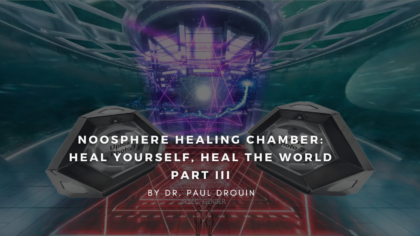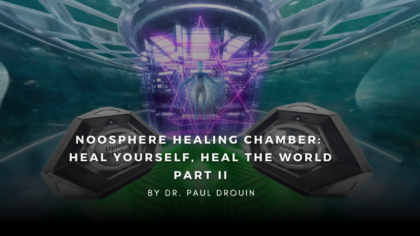Dr. Paul Drouin’s Holistic Guide to Stress Management
By Dr. Paul Drouin
As we honor Stress Awareness Month, it’s an opportune time for us as holistic health practitioners to explore the profound impact stress has on our well-being and how we can manage it from a holistic perspective. At Quantum University, we advocate for a comprehensive approach that integrates the mind, body, and spirit, enabling us to foster lasting resilience and vitality in both ourselves and our clients.
In this blog, I will share actionable methods for managing stress—tools that you can use both for your personal well-being and to guide your clients in their own stress management journeys.
Understanding Stress: A Holistic Perspective
Stress is not just a physical response to external factors—it impacts our emotional, mental, and energetic systems. As holistic health practitioners, we must view stress from a multidimensional lens. This enables us to engage with stress management practices that promote true holistic well-being.
Now, let’s dive into actionable steps that we can incorporate into our daily routines and professional practices to effectively manage stress.
Actionable Methods for Holistic Stress Management
1. Prioritize Sleep
Importance: Adequate sleep is essential for managing stress. Chronic sleep deprivation leads to hormonal imbalances, increased stress hormones, and a weakened immune system. Sleep is crucial for recovery and stress resilience.
Action:
- Aim for 7-9 hours of quality sleep each night.
- Establish a calming bedtime routine: reduce screen time, avoid caffeine late in the day, and practice relaxation techniques like deep breathing or gentle stretching before bed to improve sleep quality.
2. Regular Exercise
Benefits: Exercise is a natural stress reliever, promoting the release of endorphins that improve mood and reduce anxiety. Regular physical activity also enhances overall physical health, which in turn improves our ability to manage stress.
Action:
- Incorporate at least 20 minutes of physical activity daily. Walking, swimming, cycling, or even climbing can all be effective forms of exercise.
- Choose activities that you enjoy, as this makes it easier to stay consistent in your exercise routine.
3. Mindful Eating
Connection: Nutrition plays a significant role in stress levels. Unhealthy eating habits—like consuming too much caffeine, sugar, or processed foods—can exacerbate the body’s stress response.
Action:
- Focus on a balanced diet rich in fruits, vegetables, whole grains, and healthy fats.
- Avoid excessive caffeine, sugar, and processed foods that can spike stress levels.
- Include adaptogenic herbs (such as Ashwagandha or Rhodiola) in your diet to support the body’s resilience to stress.
- From a holistic nutrition perspective, mindful eating goes beyond food choices, it’s about tuning into the body’s needs, honoring emotional well-being, and supporting the body’s natural healing processes.
4. Practice Mindfulness and Meditation
Purpose: Mindfulness and meditation allow us to calm the mind, bring our awareness to the present moment, and reduce anxiety. These practices have been shown to improve focus, reduce inflammation, and support overall mental and physical health.
Action:
- Dedicate time each day to mindfulness or meditation practice. You can start with just 5 minutes and gradually increase.
- Explore different types of meditation techniques such as guided imagery, deep breathing, or progressive relaxation.
- Encourage clients to practice mindful breathing to calm the nervous system.
5. Engage in Hobbies
Distraction: Engaging in hobbies can provide a healthy distraction from stress and promote creativity. Hobbies help shift our focus, reduce tension, and improve overall mood.
Action:
- Find a hobby that you enjoy, such as painting, gardening, or playing a musical instrument. Regular engagement in these activities can help reduce stress and provide emotional release.
6. Connect with Nature
Healing Power: Spending time in nature significantly reduces stress levels and improves mood. Natural settings have a calming effect, helping the body restore balance and promoting emotional well-being.
Action:
- Take regular walks in natural settings. Whether in a park, forest, or along the beach, nature provides rejuvenation.
- Practice forest bathing or simply spend time in quiet outdoor spaces to recharge your energy and relieve stress.
7. Social Support
Importance: Social connections are vital for emotional well-being. Having a support system can provide relief from stress, reduce feelings of isolation, and foster a sense of community.
Action:
- Connect with loved ones regularly, whether through phone calls, video chats, or in-person meetings.
- Encourage clients to build and nurture strong social networks for support during stressful times.
8. Limit Overcommitment
Awareness: Over-scheduling can contribute to burnout and increased stress. Learning to say “no” and setting healthy boundaries are key to reducing overwhelm.
Action:
- Assess your commitments and prioritize what truly matters. Determine which activities and responsibilities align with your well-being and let go of those that drain your energy.
- Encourage clients to evaluate their schedules and set aside time for self-care and relaxation.
9. Breathing Techniques
Calming Effect: Proper breathing exercises help activate the parasympathetic nervous system (rest and digest), reducing tension and promoting relaxation.
Action:
- Practice deep breathing exercises to promote relaxation. Try the 4-4-6 breath technique, inhale for 4 seconds, hold for 4 seconds, and exhale for 6 seconds, to calm your nervous system and reduce stress. As you become more comfortable, gradually increase the breath-hold:
- Start with 4-5-6 (holding for 5 seconds)
- Progress to 4-6-7 and eventually 4-7-8 for deeper relaxation.
This gradual approach helps enhance lung capacity and fosters a greater sense of calm.
Interactive Action Plan for Holistic Health Practitioners:
To integrate these methods into your practice and personal life, try the following:
- Identify Your Stress Patterns: Reflect on how stress manifests in your body, emotions, and thoughts. Identifying stress patterns is crucial for addressing the root causes.
- Create a Holistic Stress Plan: Choose one or two stress management techniques from the list to focus on for the next 30 days. Track your progress and note how these practices impact your stress levels and overall well-being.
- Develop a Client Stress Guide: Create a personalized stress management plan for your clients, incorporating mindfulness, nutrition, and self-care routines. Provide them with actionable steps they can take each day to reduce stress
Incorporating these holistic stress management strategies into your daily routine will help you and your clients cultivate greater resilience and vitality. Remember, consistency is key—practice these techniques regularly, find what works best for you, and share these tools with your clients.
Stress Awareness Month reminds us that we have the power to manage and transform stress through a holistic approach. Let’s empower ourselves and our clients to live more balanced, vibrant, and fulfilled lives through mindful stress management














